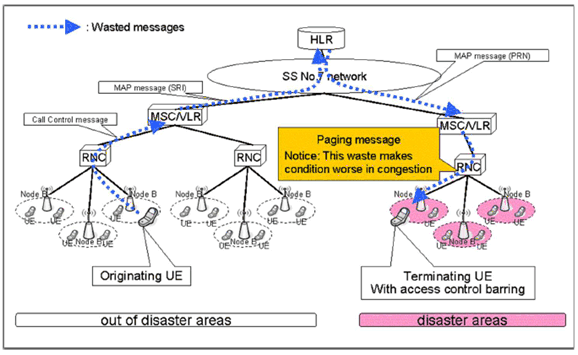Content for TR 22.908 Word version: 18.0.1
5 Considerations
5.1 Considerations with access class control
5.2 Considerations with resource reservation of terminating side
5.3 Considerations of existing operation and management of access control
...
...
5 Considerations p. 10
5.1 Considerations with access class control p. 10
Regarding communications in the condition where the originating users are the authorised users and the terminating users in the disasters are not the authorised users as identified in the use cases in clause 4.1, there is an issue that the authorised user cannot access to the unauthorised user in the condition that access class control barring is applied to the unauthorised users.
Regarding emergency service call back as identified in clause 4.2, there is an issue that emergency service center cannot make callback to the users in the condition that access class control barring is applied to the users.
Regarding the communication using voice or messaging service between the unauthorised users in the area with access control interval application as identified in clause 4.3, there is an issue that communication between UE with an access class number and UE with another access class number cannot be established.
Furthermore, it is a further consideration where the current access control mechanism prohibits any access attempts including call control and location registration.
As also described in clause 4.3, it is hardly possible to predict when and where a disaster happens. Therefore it is important that a network has to maximize the efficiency of the limited network resources for provisioning of the communications. However, with current access control scheme, even if messages establishing the multimedia telephony calls or messaging service are sent to the UEs that are access class barred, they are not allowed to respond to such messages, consequently resources for the paging messages get wasted. See Figure 5.1-1. Hence, it is a consideration where the multimedia telephony calls and messages to the users to whom access class control barring is applied to end up causing waste of network resources. The resource management efficiency with paging permission under the influence of access class barring is described in Annex X by comparing pattern 3 (i.e. with paging permission) with pattern 2 (i.e. without paging permission).

5.2 Considerations with resource reservation of terminating side p. 11
Regarding communications in the condition where the originating users are the authorised users and the terminating users in the disasters are not the authorised users as identified in the use cases in clause 4.1 and regarding emergency service call back as identified in clause 4.2, from the perspective of resource reservation there is an issue that the communications are not surely established because terminating side resource is not guaranteed with current eMLPP and access control.
5.3 Considerations of existing operation and management of access control p. 11
Considering existing operation and management of access control, all calls are barred (i.e. both originating and terminating).